
The Williamsburg Inn, the famed luxury hotel in Colonial Williamsburg that regularly plays host to celebrities and royalty (including Queen Elizabeth II, twice), recently discovered that many of its elegant doors were being propped open by brass “doormen” that depict crude racial stereotypes of African Americans. But rather than simply throwing the heavy doorstops on the scrap heap of history, the Colonial Williamsburg Foundation, which owns and operates the hotel along with three others, decided to turn the doorstops into something “teachable and affirmative” by melting them down and recasting the brass into a plaque bearing the words from an iconic speech by Martin Luther King, Jr.
The plaque was presented to the city’s historic First Baptist Church during Monday’s “Let Freedom Ring: A Call to Heal a Nation” gala. Founded in secret in 1776, the Church is one of the country’s oldest African-American houses of Baptist worship and a symbol of the faith, struggle, and perseverance that marks the black experience in America.
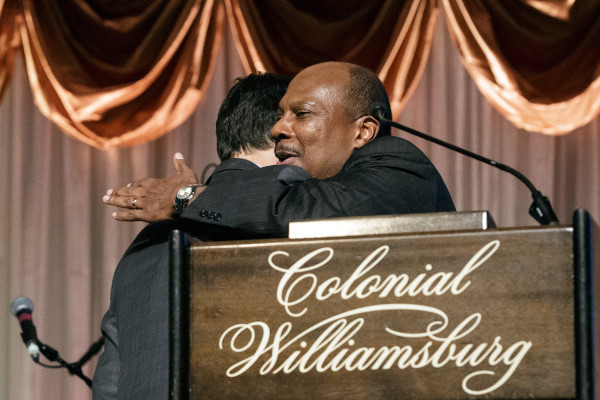
“Colonial Williamsburg exists to tell the story of America from its founding; its glories and tragedies, including the still-painful divides of racism,” said Mitchell B. Reiss, president and CEO of the Colonial Williamsburg Foundation. “These pieces are a symbol of the casual prejudice and outright racism that existed here, even among the generation of leaders that brought us liberty. We are still reconciling those contradictions today. Turning these objects of cruelty and subjugation into something truly affirmative is an apt metaphor for our nation’s unfinished progress and our need to keep at it.”
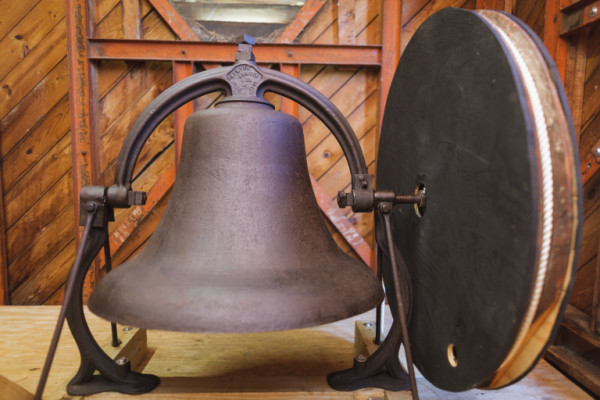
First Baptist Church turns 240 years old in 2016. Colonial Williamsburg is helping mark the occasion by repairing the church bell that lay dormant in the belfry from the days of enforced segregation until this week. It is the Church’s wish that this remarkable bell rings all day, every day, for Black History Month in February, and the whole nation is invited to take its turn ringing the bell.
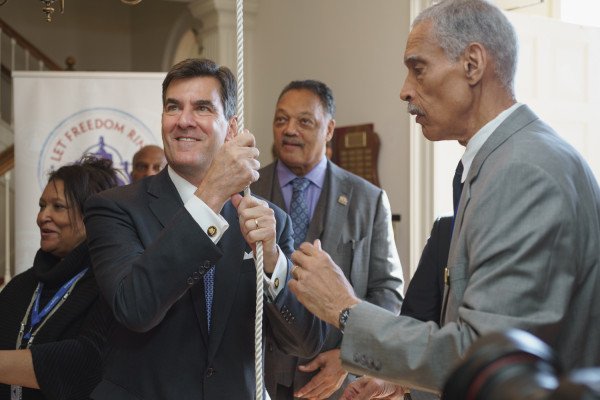 “The vestiges of prejudice in this great nation endure in sometimes subtle ways, “said the Rev. Dr. Reginald Davis, Pastor of First Baptist Church. “This type of racism is actually the most insidious kind, for it is embedded into the background of our daily lives, but in a way that nonetheless demonstrates the limited expectations and distorted caricatures some still have of African Americans. I applaud the Williamsburg Inn and Colonial Williamsburg for taking this positive step, and for literally turning hate into hope.”
“The vestiges of prejudice in this great nation endure in sometimes subtle ways, “said the Rev. Dr. Reginald Davis, Pastor of First Baptist Church. “This type of racism is actually the most insidious kind, for it is embedded into the background of our daily lives, but in a way that nonetheless demonstrates the limited expectations and distorted caricatures some still have of African Americans. I applaud the Williamsburg Inn and Colonial Williamsburg for taking this positive step, and for literally turning hate into hope.”
“Clearly, the very existence of these brass doorstops is offensive and this type of depiction will not be tolerated in our hotels,” said Florencio Ferrao, vice president of hospitality at Colonial Williamsburg. “We thought the most appropriate thing to do with them was to mold them into a plaque bearing Martin Luther King, Jr.’s famous ‘I Have a Dream’ speech. King prayed in First Baptist Church, but never heard the sound of the bell calling people to faith or tolling for freedom.”
The provenance of the brass doorstops is unknown, however many of the decorations and furnishings in Colonial Williamsburg’s historic homes and hotels collection are donated or drawn from large collections and bequests.
The plaque’s inscription reads:
When we allow freedom to ring,
when we let it ring from every village and every hamlet
from every state and every city,
we will be able to speed up that day when
all of God’s children,
black men and white men, Jews and Gentiles, Protestants and Catholics
will be able to join hands and sing in the words of the old Negro spiritual,
“Free at last! Free at last! Thank God Almighty, we are free at last!”
- DR. MARTIN LUTHER KING, JR.
PRESENTED TO FIRST BAPTIST CHURCH
BY
The Colonial Williamsburg Foundation
GUEST BLOGGER: JOE STRAW
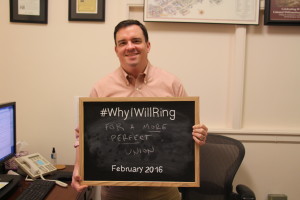 Joe is a public relations manager with Colonial Williamsburg, focusing on media engagement related to the Historic Area, the Art Museums and educational outreach. Joe joined the foundation in 2014 after a long haul in print journalism. A lifelong fan of history and of learning in general, he’s thrilled to work in a place where he gets lessons each day from colleagues at the top of their fields.
Joe is a public relations manager with Colonial Williamsburg, focusing on media engagement related to the Historic Area, the Art Museums and educational outreach. Joe joined the foundation in 2014 after a long haul in print journalism. A lifelong fan of history and of learning in general, he’s thrilled to work in a place where he gets lessons each day from colleagues at the top of their fields.
Outside work Joe gets his kicks from family, friends, his dogs, and Star Wars movies.
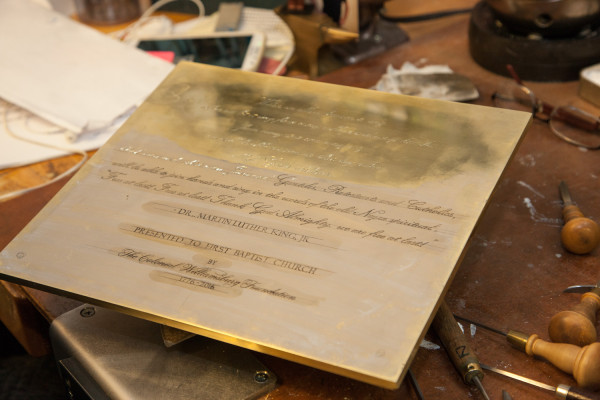
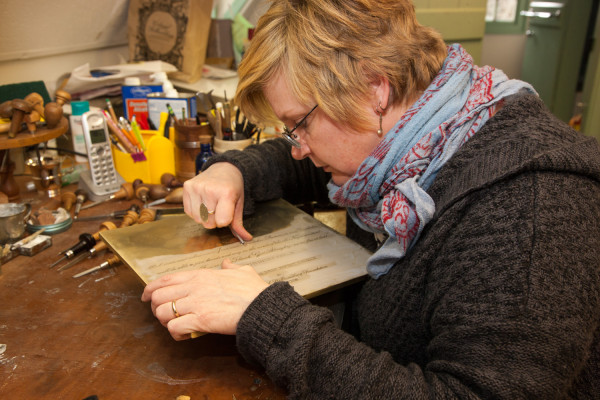
Peggy says
Hoje eu não posso acreditar que ninguém mais está ganhando dinheiro como eu, aproveitando
comércio na internet!
integradores de sistemas says
Maravillo post. Gracias por aportarlo…Espero màs…
Saludos
integradores de sistemas http://www.telmar.es/integradores-sistemas.html
Bill says
I’ve been browsing on-line greater than 3 hours as of late,
but I never discovered any interesting article like yours.
It is pretty price sufficient for me. In my view, if all webmasters and bloggers made excellent content as you did, the internet will probably be much more helpful than ever before.
Peter says
Cannot find a single picture of the doorstops in question. It would have been helpful for understanding why they are offensive. The only brass doorstops from Williamsburg found online is a style referred to as the “Hessian Soldier”. One can find it easily on Google under that phrasing. It looks vaguely Black Americana, but this ultimately seems to be a case of intentional misidentification for some good PR.
I am a lifelong Democrat and Liberal, but I oppose the current efforts to destroy history by removing/destroying items that are not currently approved of. Similarly the craziness of deprecating various of our Founding Fathers who did tremendous good for this country but were slaveholders.
Things should be presented in context.
I think most all of the people doing this haven’t contributed one iota as much to the world as the people they criticize. It is very small-minded.
I am sorry to see Williamsburg doing this. It really has removed my desire to visit.
It occurs to me that logically slave cabins should be destroyed, if one follows this crazy reasoning.
Thanks you for reading about this important effort and for sharing your thoughts and questions. The items were discovered in locations where their nature was not immediately conspicuous to Colonial Williamsburg employees or guests. While all of Colonial Williamsburg’s doorstops were destroyed, the Foundation retains one on loan from a private collection. Again, we appreciate your interest, concern and support!
Betsy M says
What kind of a brass doorstop can be racially offensive, and why on Earth did the Williamsburg Inn only recently discover that they were propping many of their elegant doors open with them?
Beth Oliver says
I am a new resident of Virginia near Williamsburg. Can someone explain to me the use of the Confederate Battle Flag? I am a Northerner and did not grow up with it flying on porches and decorating license plates. Some Caucasian friends insist that it isn’t racist. African American friends are uncomfortable with it. I find it offensive and wouldn’t think of displaying it. Although it is part of American History, do we still need to show it?
While I applaud what you are doing, at least one or two should be kept in the museum. This is also part of American history.
Thanks for posting! We just got our time for 2/12.
Harry Heiss says
I certainly hope that Colonial Williamsburg curators had the foresight to retain and preserve one example of these racially insensitive brass door stoppers for its museum collection. Not for display, but for research and as an historical artifact. If not, then why? If so, then this otherwise interesting article perhaps should have mentioned that, since preservation, research, and education are at the heart of what Colonial Williamsburg is or should be about. To whitewash and erase history is to sweep the unpleasant past under the rug.
I also think the doorstops should have been preserved as a historical artifact. They could have easily been used to facilitate discussion on race and perceptions of African-Americans at the time the doorstops were created. It seems a little strange that an institution like Colonial Williamsburg wouldn’t preserve that history. History is history. We can’t change it but we can talk about it and learn from it.
nobody2 says
I was curious about this too and tried to look it up - the only thing I saw repeatedly was a brass doorstop of a colonial man that could possibly be taken to be african american, but each one I saw is called a “hessian soldier” - they are all over ebay. I wonder if this could be the same type of doorstop or if those were something different. I can certainly see why a “lawn jockey” type ornament or caricature of an african american person (and if colonial, it’s probably depicting a slave) might be offensive for sure in a hotel setting or otherwise today. I’m sure they must have saved a couple, and probably had lots.